 In 2002, the Hugo Award for Best Novel went to Harry Potter and the Goblet of Fire. Science fiction author Gregory Benford was not impressed, and he gave his views on the situation in 2005:
In 2002, the Hugo Award for Best Novel went to Harry Potter and the Goblet of Fire. Science fiction author Gregory Benford was not impressed, and he gave his views on the situation in 2005:
“Fantasy has very, very cleverly managed to capture the apparatus erected by science fiction fandom and pro-dom, and fantasy writers now dominate the Science Fiction Writers of America. They’ve taken over the Hugo awards—which I thus usually don’t attend. A Harry Potter novel won a few years back and I walked out.
I think this move to fantasy has led to a core lessening of what I value in the larger genre, with a lot less real thinking going on about the future. Instead, people choose to be horrified by it, or to run away from it into medieval fantasy. The American culture that once read Heinlein and went the moon now puts George Martin (a very good writer, who started in sf) on the bestseller lists, and goes nowhere.”
I mention this because it was the first Hugo-related controversy that I was around to witness first-hand – I am too young to have been around when the Church of Scientology used its pulling power to ensure an L. Ron Hubbard novel was nominated. And to me, it makes for an amusing contrast with a more recent complaint: that the Hugos are not honouring enough escapist fantasy.
A Short History of Sad Puppies
Back in January 2013, Campbell-nominated novelist Larry Correia launched a tongue-in-cheek campaign to win a Hugo, painting himself as a populist opponent to a snobbish Hugo establishment:
“Should I vote for the heavy handed message fic about the dangers of fracking and global warming and dying polar bears and robot rape as a bad feminist analogy with a villain who is a thinly veiled Dick Cheney? Or should I vote for the LAS VEGAS EXPLOSION SHOOTING EVERYTHING DRAGON HELICOPTER CHASE ORC SACRIFICING CHICKENS BOOK!?! Grglglgggggsllll………BOOM!”
This is, if nothing else, a reasonably forthright statement of Mr. Correia’s position. Later that month, he wrote a second post on the same subject. This time, Correia made his case in the form of a spoof TV infomercial script:
“For generations literary critics and college English departments have looked down at pulp novelists and refused to give them awards…
(show old-timey picture of HP Lovecraft, show old-timey picture of Robert E. Howard, show old-timey picture of Robert E. Howard punching out a Tyrannosaurs Rex while a woman in a chainmail bikini holds onto his leg)
Even though those guys are totally freaking awesome, and Conan the Barbarian is a thousand times more awesome than the Great Gatsby, you wouldn’t know it by listening to literary snobs. The hoighty-toighty literati snobs prefer heavy handed, ham fisted, message fiction.”
Correia’s inspiration was “that Sarah McLachlan commercial on TV where they play the sad song and show injured puppies and dying kitties and it totally screws up your whole day.” And so, he tagged the post with the simple phrase “Sad Puppies.” He continued to use this tag for subsequent posts about the Hugos, including one listing his personal nomination choices.
At this point, however, “Sad Puppies” was simply Larry Correia goofing around on his personal blog. To see how it became a successful campaign, we must fast forward a little…
 Puppies Getting Bigger
Puppies Getting Bigger
In January 2014, Larry Correia announced that he would continue his campaign. Sad Puppies 2 involved similar jabs at typical Hugo nominees (“most of them are screeds about corporate greed, global warming, dying polar bears, or whatever the left wing cause of the day is”) but this time Correia announced his campaign as a “plea to my fans to nominate some good stuff for the Hugo awards” – the implication being that he was no longer the only Sad Puppy in the pound. He then posted his own picks for nomination; crucially, he later referred to these as the “Sad Puppies 2 slate.”
Enter Brad R. Torgersen, who took over the reins (leads?) of the Sad Puppies for 2015:
“In the last decade we’ve seen Hugo voting skew more and more toward literary (as opposed to entertainment) works. Some of these literary pieces barely have any science fictional or fantastic content in them. Likewise, we’ve seen the Hugo voting skew ideological, as Worldcon and fandom alike have tended to use the Hugos as an affirmative action award: giving Hugos because a writer or artist is (insert underrepresented minority or victim group here) or because a given work features (insert underrepresented minority or victim group here) characters.
[…]
Thus, I am going to slowly compile a slate. Of books and stories (and other things, and people) for the different categories. So that hopefully deserving works and artists — who tend to be snubbed at awards season — get a chance on the final ballot.”
Torgersen unveiled his slate on the first of February, a short while after the nomination process opened, following “a tremendous amount of internal debate” within the campaign. On February 2, author Vox Day published a slate that he called the Rabid Puppies; this was very similar to the Sad Puppies picks, albeit with a few changes here and there (most noticeably multiple nominations for John C. Wright). Day’s intention was to wreck the Hugos – an aim that Torgersen found deeply objectionable.
The Sad Puppies campaign was widely misrepresented in in the press, such as when Entertainment Weekly’s Isabella Biedenharn inaccurately and unfairly described it as “a campaign in which misogynist groups lobbied to nominate only white males for the science fiction book awards.” Of course, this kind of hyperbole can be found on both sides of the fence. Take a look at this posting from a pseudonymous Reddit user:

The grave talk of a fight against a “toxic” and “hateful” ideology that controls the Hugos is a long way from the puckish humour of Correia’s early posts. At this point, what started out as a jokey bit of grandstanding has begun to resemble an online holy war against “SJW” hordes.
This element of moral imperative is the key distinction between the Sad Puppies campaign and earlier exercises in slate-voting, such as John Scalzi’s “Award Pimpage”. When a slate of potential nominees is taken as a simple suggestion, that is one thing; when it is taken as a call to arms against evil forces, that is quite another.
And the Winner Is… Well, Nobody
I am, of course, awfully late to the party, and by now I think just about anyone reading this will know the result of the two campaigns. The Sad and Rabid Puppies gathered enough support to sweep the nominees with a mixture of choices from the two slates. And yet, they also had enough detractors to keep almost all of those choices from winning – even if it meant voting “no award” to the tops of multiple categories.
Both sides took this as a victory. Many opponents of the Puppies congratulated themselves on keeping the slated works from winning, while supporters took the results as evidence that the Hugos were run by “SJWs” who barred any nominees with the wrong ideology.
Myself, I would have to agree with Liana Kerzner: “No one won. It was just a disruption in the Force like Palpatine ripped a big fart.”
Now the Space-Dust Has Settled
When I made my belated arrival to the Sad Puppies debate, I decided to cut right through the ideological issues and focus on something that I felt had been largely neglected: the stories themselves.
Given that any discussion of Sad Puppies 2015 will now be confined to past tense, I reasoned that I may as well take a step even further back into history by looking at the 2014 Hugo nominees. After all, these would presumably contain examples of the “SJW message fiction” that inspired the campaign, and should make an interesting contrast with the Puppy nominees.
My next consideration was how many of the Hugos’ sixteen categories to cover. I decided to skip Best Graphic Story, as the Puppies were clearly uninterested in it: the Sad and Rabid slates contained just one comic between them. A look at the past nominees for Best Dramatic Presentation (Long Form) suggests that the Puppy picks are more or less the kind of thing that gets nominated in this category anyway – it is telling that Guardians of the Galaxy was the only Puppy choice to actually win a Hugo. Much the same can be said of Best Dramatic Presentation (Short Form), save that the Puppy slates contain rather less Doctor Who and rather more Cartoon Network than might otherwise be expected from the Hugos.
Best Fanzine, Best Semiprozine and Best Fancast all cover year-long serialised projects, which are too unwieldy for easy comparisons. For similar reasons, I am also skipping any category that covers individuals rather than specific works, such as Best Professional Artist.
This left me with the five categories that I believe form the main Sad Puppies battleground: Short Story, Novelette, Novella, Novel and Related Work.
I shall start my overview with the Short Story category…
Best Short Story: 2014 Hugo Nominees
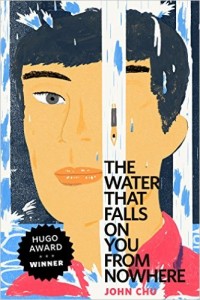 “The Water That Falls on You from Nowhere,” by John Chu (winner)
“The Water That Falls on You from Nowhere,” by John Chu (winner)
You know how lightbulbs appear over cartoon characters’ heads when they have ideas? Ever stopped to think what it would be like if that kind of thing happened in the real world? You would be able to tell what was going on in someone’s head by physical changes around them. Just imagine…
This is the hook of “The Water That Falls on You from Nowhere.” John Chu’s story is set in a world where, whenever somebody tells a lie, cold water will suddenly fall on them. The bigger the lie, the more the water. It is as though everyone has Pinocchio’s famous nose.
The main character in the story is Matt, a young man whose family has a very traditional outlook on the world: his parents view him as their last hope for a grandson. They know that Matt is in a relationship; what they do not know, however, is that his lover is another man. Thanks to the water showers Matt is unable to pretend that he has a girlfriend, so his only option is to come out of the closet. Will he pluck up the courage…?
At the beginning of the story, Chu spends most of his time playing with his story’s central fantasy concept:
“Uttering ‘this sentence is false’ or some other paradox leaves you with such a sense of angst, so filled with the sense of an impending doom, that most people don’t last five seconds before blurting something unequivocal. So, of course, holding out for as long as possible has become the latest craze among drunk frat boys and hard men who insist on root canals without an anesthetic. After this, however, the falling water ends up playing a surprisingly small role in the story.”
It is clear from the start that Chu did not write the story as a serious exploration of a society in which nobody can tell a lie and get away with it. However, he does not seem particularly interested in approaching his idea as a piece of cartoonish whimsy, either. By the end of the story, the fantasy element is essentially a single poetic image: snow melting as Matt tells the truth.
The meat of Chu’s narrative lies in the relationship between Matt and his boyfriend, and Matt’s dealings with his family. The character relations are handled convincingly, and the overall story is warm and uplifting. On the whole, I would call the story a success.
But the fantasy element could easily be removed, with only a few small changes necessary to paper the cracks in the narrative. “The Water That Falls on You from Nowhere” is a fine story, certainly; but I am not sure I would call it a particularly good fantasy story.
“Selkie Stories are for Losers,” by Sofia Samatar
This story is told from the point of view of a teenage girl with a negative fixation on folktales of Aarne-Thompson type 402, also known as animal bride stories. In these tales,the protagonist’s wife or mother turns out to be a shapeshifter – such as a selkie – who ups and leaves the family forever.
The girl’s strange obsession with such stories came about when her mother left home, never to be seen again. “Selkie Stories are for Losers” does not contain any literal fantasy elements – that is, it is never explicitly stated that the mother was some kind of supernatural entity. But it is clear that the narrator associates her mother with the selkie of legend, so much so that she relishes the prospect of moving to a landlocked state – where, presumably, nobody will be able to vanish into the sea.
The second major character in the story is Mona, a friend of the narrator. Mona, too, has family problems: her mother has a history of attempting suicide. The protagonist appears to associate this situation with selkies, much to Mona’s bewilderment:
“[I]t’s true that Mona cries a lot. She cries because she’s scared her mom will take her away to Egypt, where the family used to live, and where Mona has never been. ‘What would I do there? I don’t even speak Arabic.’ She wipes her mascara on her sleeve, and I tell her to look at the lamp outside and pretend that its glassy brightness is a bonfire, and that she and I are personally throwing every selkie story ever written onto it and watching them burn up.
‘You and your selkie stories,’ she says. I tell her they’re not my selkie stories, not ever, and I’ll never tell one, which is true, I never will, and I don’t tell her how I went up to the attic that day or that what I was looking for was a book I used to read when I was little, Beauty and the Beast, which is a really decent story about an animal who gets turned into a human and stays that way, the way it’s supposed to be.”
One paragraph reveals that the narrator is attracted to Mona, but has not plucked up the courage to make a move: “It’s not that I think she’d freak out or anything… I’m afraid she’d kiss me back, but not mean it.” The departure of her mother appears to have left the protagonist with trust issues; perhaps on some level she fears that Mona will also turn out to be a selkie, vanishing from her life at the drop of a hat.
Sofia Samatar uses the selkie motif to explore the damaged psyche of her teenage heroine, and does a good job of it. The story paints a convincing psychological portrait, putting an age-old folktale theme to new use in the process. A worthy example of psychologically-oriented fantasy writing.
 “The Ink Readers of Doi Saket,” by Thomas Olde Heuvelt
“The Ink Readers of Doi Saket,” by Thomas Olde Heuvelt
In this tale, the residents of a rural Thai village send flowers down a river in the hopes of having their wishes granted. Thomas Olde Heuvelt’s treatment of superstition is resolutely unsentimentalised: near the start, the story relates how a woman was buried waist-deep in a rice field as punishment for lewd behaviour, “so that her excess fertility could seep into the crops.”
“The Ink Readers of Doi Saket” is a magical realist story, with the supernatural concepts set alongside references to cars, computers, karaoke and David Beckham. The villagers have their wishes granted – albeit not in the ways that they might have expected.
Heuvelt shows a dust-dry sense of humour that recalls Saki. Witness the fate of Daeng, the mordant irrigator who wishes for death:
“Daeng nodded off behind the wheel while driving along the main road. He rammed a truck full of pigs on their way to the slaughterhouse, rolled fourteen times, and found new joy in life when he realized he had survived the crash without a scratch. Contrary to the pigs.”
Quiet, understated and carrying a sting in its tail – a good choice of nominee and, for my money, a deserving winner.
“If You Were a Dinosaur, My Love,” by Rachel Swirsky
Here we have the Big One. This is the story that, more than any other, Sad Puppy supporters have pointed to as evidence that the Hugos are dominated by “SJWs” – and the Nebulas, too, given that the story succeeded in winning that award.
The story is written from the point of view of a paleontologist’s fiancée, daydreaming about her husband becoming a dinosaur:
“If you were a dinosaur, my love, then you would be a T-Rex. You’d be a small one, only five feet, ten inches, the same height as human-you. You’d be fragile-boned and you’d walk with as delicate and polite a gait as you could manage on massive talons. Your eyes would gaze gently from beneath your bony brow-ridge.
If you were a T-Rex, then I would become a zookeeper so that I could spend all my time with you. I’d bring you raw chickens and live goats. I’d watch the gore shining on your teeth. I’d make my bed on the floor of your cage, in the moist dirt, cushioned by leaves. When you couldn’t sleep, I’d sing you lullabies.”
What starts out as mere whimsy soon takes on a surreal element: “If you sang unrequited love songs, I’d take you on tour. We’d go to Broadway.” The narrator imagines a happy life with her diminutive dinosaur, like something out of a mildly offbeat children’s book.
And then we have the twist. The reason the narrator is having this flight of fantasy is because, in real life, her fiancé was put into a coma after being attacked by a mob of drunken bigots:
“A T-Rex, even a small one, would never have to stand against five blustering men soaked in gin and malice. A T-Rex would bare its fangs and they would cower. They’d hide beneath the tables instead of knocking them over. They’d grasp each other for comfort instead of seizing the pool cues with which they beat you, calling you a fag, a towel-head, a shemale, a sissy, a spic, every epithet they could think of, regardless of whether it had anything to do with you or not, shouting and shouting as you slid to the floor in the slick of your own blood.”
Like “Selkie Stories are for Losers,” “If You Were a Dinosaur, My Love” is the story of a psychologically damaged character who has turned to fantasy to escape from the traumatic loss of a loved one.
The reaction in some quarters to this story’s nomination was, as I noted, not pretty. John C. Wright described the piece as “disturbing” and said that people who voted for it “deserve the whipping post.” Sarah A. Hoyt found a classist subtext in the story, arguing that the briefly-described attackers are working-class caricatures.
Writing for Breitbart, columnist Allum Bokhari sneered at “widely-ridiculed, sub-Tumblr standard works of fiction such as If You Were a Dinosaur, My Love and Chicks Dig Time Lords” (the latter title, incidentally, is actually non-fiction). The Political Hat, which ran a parody entitled “If You Were a Chipmunk,” called the story “a perfect example of the rabid viciousness of Social Justice Warriors” and summarised the plot as “a limp-wristed homosexual Italian Muslim tranny dinosaur walks into a bar” (this, to me, misses the point: we can infer from the attackers’ slurs that the palaeontologist was a dark-skinned man of somewhat effeminate appearance, but beyond this, his identity is kept ambiguous).
In a thread on Reddit, one poster strangely called the story “a revenge fantasy, where the fantasist is revealed as a racist” while another dismissed its accolades as “fraudulent awards by SJW-appropriated corrupt award organizations”. A third poster defended the story – and appears to have been banned from the subreddit as a result.
It was impossible for me to approach the story with fresh eyes, having first read it after sampling the above criticism. My initial reaction was “well, it’s not that bad.” Rachel Swirsky was clearly writing from the heart, and when you write from the heart, you will inevitably alienate people.
Do I think the story deserves a Hugo or Nebula? Not really – especially not in the same year as the aforementioned “Selkie Stories”, a more sophisticated treatment of a similar concept. Do I see it as an example of a pernicious trend that should be vanquished at all costs? Definitely not.
Best Short Story: 2015 Sad and Rabid Puppies
“Totaled,” by Kary English (Sad and Rabid Puppies, nominated for Hugo)
by Kary English (Sad and Rabid Puppies, nominated for Hugo)
Maggie, a neuroscientist, is fatally injured in a car accident. Her cohorts have been working on a method of keeping disembodied animal brains alive – and Maggie becomes the first human specimen to be used in their experiments.
“Totaled” is told from the point of view of Maggie’s brain. It charts her journey from initial confusion, to the regaining of her senses through artificial means, and finally to acceptance of her fate. Sense is a key part of the story, and Kary English’s tactile writing style pulls off this aspect perfectly.
English puts the story’s neurological concepts to good use, the main example being how Maggie communicates using an fMRI device. Her lab partner Randy asks her a series of yes/no questions, and she is able to answer them by conjuring up emotive images for herself – fresh coffee for “yes,” cat vomit for “no.”
Brains in jars may be nothing new as far as science fiction is concerned, but this story has a strong approach to the old idea. There are obvious shades of Kafka in Maggie’s metamorphosis, and parts of her narration read like a nightmare (“I can feel myself screaming, my phantom mouth open wide, phantom hands covering phantom ears”), but the general tone of the story is one of poignant nostalgia.
Early on in the story, English works in a brief comment on Obama-era healthcare reform and its detractors:
“The personal total wasn’t a new concept. It started back in the Teens when the Treaders put their first candidate in office. Healthcare costs were insane. Insurance was almost impossible to get. The Treaders said taxpayers shouldn’t have to pay for medical care someone else couldn’t afford, so they instituted a review board for totals.
The uneducated, the elderly, the poor—they could be totaled at less than a year’s wages. My doctorate put my total at lifetime earnings plus a multiplier for patents. My policy was supposed to be enough to cover anything. I thought I was safe.”
“Treaders” presumably refers to the “don’t tread on me” slogan adopted by the Tea Party. Beyond this, however, the story is not concerned with exploring the wider ramifications of the medical breakthrough that it depicts. At its heart, “Totaled” is the story of woman at the end of her life, looking back on her past through the lens of her scientific studies.
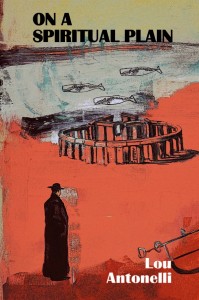 “On a Spiritual Plain,” by Lou Antonelli (Sad and Rabid Puppies, nominated for Hugo)
“On a Spiritual Plain,” by Lou Antonelli (Sad and Rabid Puppies, nominated for Hugo)
The main character in this story is a chaplain stationed at an Earthling colony on the alien planet of Ymilas. Upon death, the inhabitants of this planet continue to exist as spirits (explained in quasi-scientific terms as sparks of “eternal extra-dimensional overarching consciousness[es]”) that are accepted as a part of Ymilan society. When a Ymilan spirit feels that it is time to pass on, they can travel to the planet’s North Pole and have their forms dissipated by a magnetic field.
This phenomenon is not limited to the natives. One of the humans of the colony dies, and likewise becomes a ghost – prompting the chaplain to contemplate the nature of afterlife.
“On a Spiritual Plane” has a strong concept, but does an inadequate job of actually exploring the idea. The chaplain theorises that the true soul departs at the moment of death and that the spirits of Ymilas are something more illusory, but he is quickly hushed up by another character and does not pursue this line of thought in any depth. This is especially baffling when we consider that the story was published in Sci Phi Journal, a publication that emphasises philosophical enquiry in science fiction.
In his book Letters from Gardner (which I shall be talking about when I get to Best Related Work) Antonelli acknowledges that his background as a journalist shows through in his fiction. In some of his stories, the matter-of-fact clarity of his writing style works in his favour. With “On the Spiritual Plane”, however, he picked a subject that is just too subtle to fit his authorial approach.
Antonelli himself, incidentally, came out in support of the Sad Puppies campaign: “In a time when typical literary s-f is dystopian slipsteam pornography, it’s nice to be reminded that there is still core s-f out there,” he wrote.
“Goodnight Stars,”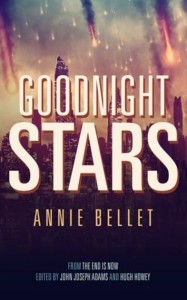 by Annie Bellet (Sad and Rabid Puppies, Hugo nomination withdrawn)
by Annie Bellet (Sad and Rabid Puppies, Hugo nomination withdrawn)
This story follows the pattern set out by Hollywood disaster movies. The world is facing an apocalyptic threat and a group of protagonists flee to safety; along the way, they must tie up their personal relationships while fending off ruffians who are taking the opportunity to cause mayhem.
But despite the well-worn nature of its subject matter, “Goodnight Stars” is a splendid tale. The brevity of the story means that there is little time for familiarity to set in, while Annie Bellet succeeds in bringing warmth and humanity to her narrative.
The story begins with meteors destroying the moon; the college-age protagonist, Lucy is shaken to her core – her astronaut mother was on a lunar base. The loss of the familiar body from the night sky symbolises the sudden loss of Lucy’s parent, something that hangs over the protagonist for the duration of the story. She is forced, abruptly, to confront her strained relationship with her mother, which manifests itself in a number of ways – for example, she has been trying to hide her Puerto Rican heritage (which came from her mother’s side) by passing herself off as white.
Crucially, Lucy comes across as a person, not a formula-fiction cypher. Her character arc reaches a genuinely touching conclusion at the story’s close.
Out of all the stories covered here, I would argue that “Goodnight Stars” is the all-rounder. It has something for everyone, being at once heartfelt, reassuringly familiar and entertaining. In an alternate universe where Sad Puppies and the “no award” votes never occurred, I can easily imagine it being popular enough to win the Hugo.
“Goodnight Stars” was nominated, but Annie Bellet decided to withdraw it from the contest. “I am withdrawing because this has become about something very different than great science fiction,” she wrote; “I find my story, and by extension myself, stuck in a game of political dodge ball.”
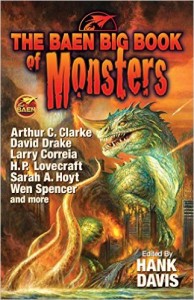 “A Single Samurai,” by Steven Diamond (Sad Puppies, nominated for Hugo)
“A Single Samurai,” by Steven Diamond (Sad Puppies, nominated for Hugo)
A samurai finds the corpse-strewn ruins of a village, which turns out to have been destroyed by a colossal beast. The protagonist refers to the monster as a kaiju, a term used in Japan to identify the likes of Godzilla, but is unable to fully describe the creature: “It had no definitive form that I could identify. It was simply too big, and my view too limited.”
There are definite shades here of Robert E. Howard, who was fond of pitting his sword-wielding heroes against intangible, unknowable devils – although the samurai’s musings about fate, duty and sacrifice make him a rather more analytical protagonist than Howard’s rough-and-ready protagonists. And like Howard, Steven Diamond shows a strong ability to simple narrative going at a rollicking pace.
The downside is that the story is lacking in surprises. At one or two points it delivers modestly unusual imagery – a scuffle against puma-like creatures with stones coming out of their backs, a climax inside the monster’s head – but once the samurai relates how his father committed hara-kiri, most readers will have figured out the rest of the story.
As a throwback to the pulp sword-and-sorcery of the thirties, “A Single Samurai” is a perfectly fine example of its kind. But when we consider how many Howard pastiches are written every year, it is reasonable to question exactly what makes this one Hugo-worthy.
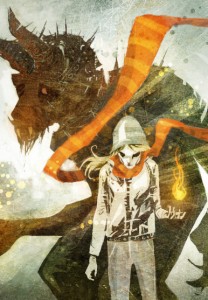 “Tuesdays With Molakesh the Destroyer,” by Megan Grey (Sad Puppies, not nominated for Hugo)
“Tuesdays With Molakesh the Destroyer,” by Megan Grey (Sad Puppies, not nominated for Hugo)
Here we have one of those stories where much of the narrative, already implied in the title, is spelt out in the opening paragraph:
“Molakesh the Destroyer moved into the house next door the summer I turned fifteen. There was the expected neighborhood gossip at first, with Mom and her friends worrying about what having a demon on our street might do for property values and with one particularly zealous neighbor lining her property with crosses, but it died down after a few months. Destroyer he may be called, but he kept his yard tidy and pulled in his trash cans at night, so the Homeowners Association turned their scowls on other targets.”
The subject of a kid with a fantastic friend is a popular one in children’s literature, and has been for some time: past examples include Clive King’s Stig of the Dump, Robert Leeson’s The Third-class Genie and Margaret Barry’s Simon and the Witch. A particularly relevant comparison is Jamie Thomson’s Dark Lord: The Teenage Years from 2011, in which a fantasy archvillain is reincarnated as an adolescent boy and sent to a suburban foster-home. Megan Grey’s tale of the friendship between a teenage girl and an intimidating (but ultimately harmless) demon from hell is an amiable and inoffensive affair, despite its general predictability.
As the two protagonists clear snow from a driveway in their own individual manners – narrator Sarah uses a shovel, Molakesh uses hellfire – they discuss a few real-world concerns that are perennial favourites in young adult fiction, namely parental divorce and school bullying. Grey gets some humorous moments by contrasting the everyday issues faced by Sarah with the fantasy viewpoint of Molakesh:
“You would never do as a sacrifice anyway.”
I frowned. “Why not?”
He pointed at my face with one of his claws. “Your blemish. I like my sacrifices unstained.”
“It’s a birthmark,” I snapped. I got enough crap from kids at school about the dark patch extending from my left cheekbone to the corner of my mouth. I sure as hell didn’t need to take any from some ancient demon.
“I was referring to your acne.”
“Oh.” This probably shouldn’t have made me feel better, but it did.
While it is not a particularly sophisticated story, it is at least an enjoyable runaround. Presumably it made the Sad Puppies list as part of the campaign’s push for entertainment value over literary experimentation.
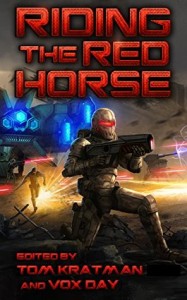 “Turncoat,” by Steve Rzasa (Rabid Puppies, nominated for Hugo)
“Turncoat,” by Steve Rzasa (Rabid Puppies, nominated for Hugo)
Cyborgs and biological humans are at war. Taren X 45 Delta, an artificial intelligence, is programmed only to destroy the supposedly inferior species known as mankind. During the heat of battle, however, he starts to have second thoughts about the mission for which he was created…
While the plot of “Turncoat” is simple – I imagine that, if you were to ask a class of teenagers to write a story about artificial intelligence, a significant number would come up with this exact premise – it is solid. With a strong execution, the idea could make a worthwhile story.
But with “Turncoat,” writer Steve Rzasa seems content to pump out the kind of gizmo-obsessed prose that gives hard SF a bad name, this paragraph being typical:
“My eight torpedoes are engulfed by the swarm of counter-fire missiles. The Yellowjackets explode in bursts of tightly focused x-rays, highlighted in my scans as hundreds of slender purple lines. My torpedoes buck and weave as they take evasive manoeuvres. Their secondary warheads, compact ovoid shapes nestled inside their tubular bodies, shatter and expel molybdenum shrapnel at hypervelocities. Tens of thousands of glittering metal shards spray out in silver clouds against the void of space.”
Rzasa’s key misjudgement is in having the artificial intelligence narrate the story, without taking the time to give this character an engaging point of view: he is just another generic killer robot.
At one point, the AI tells us that what looks like a jumble of explosions to a human observer is, to him, “an indescribably beautiful ballet”. The only reason this sight is “indescribable,” of course, is because Rzasa has decided not to bother describing it. Instead of portraying the AI’s viewpoint with any grace or subtlety, he informs us that “the spray of nanites released in the molybdenum shards have reached the Ascendancy ships” and that “the second pair of corvettes similarly turn on each other, each going for the other’s throat, so to speak”. A missed opportunity.
In fairness, I should mention that the story takes place in the same universe as the Quantum Mortis series that Rzasa co-wrote with Vox Day. I have not read these books; someone who is familiar with them may well be aware of some additional context that gives “Turncoat” a little more depth. Viewed as a self-contained story, though, this is entry-level science fiction.
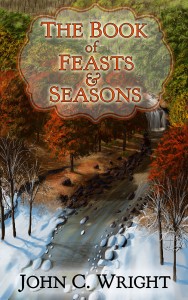 “The Parliament of Beasts and Birds,” by John C. Wright (Rabid Puppies, nominated for Hugo)
“The Parliament of Beasts and Birds,” by John C. Wright (Rabid Puppies, nominated for Hugo)
Humanity is dead, and animals of various species gather at the remains of Man’s final city. The regal Lion, the wise Owl, the loyal Hound and others react, in their own individual ways, to the loss of the beings who once ruled the earth.
As a fable that uses animals as archetypes, “The Parliament of Beasts and Birds” invites comparisons with Rudyard Kipling. It lacks the humour of the Just So Stories, however, instead emulating the earnestness of Felix Salten’s Bambi or Richard Adams’ Watership Down. Running through all of this is a Christian framework that suggests certain scenes in the Narnia books: Wright’s animals were, like humanity, tempted by the Serpent, and are now facing a final judgement of their own.
The style used by Wright is an appropriate mixture of children’s book simplicity and King James Bible sonority. This speech by the Horse is a good example:
“The serpent promised us the glory of war, and a chance to use our strength […] We were promised that we would win names of renown, as no other beast would win, Bucephelous and Grane and Traveler. We were told that our pedigrees would be counted as if they were the lineages of kings! So it was for a season. We pulled the noble chariot, not the humble plow. Our ancient pedigrees were consumed by a man named Napoleon, and our daily work was taken away by a man named Ford. The serpent told us the truth, but somehow he used that truth to tell a lie.”
The animal fantasy is a genre that tends to divide opinion, but Wright has succeeded in penning a story with an impact that belies its short length and straightforward narrative.
My Thoughts
For my part, I would quite happily have voted for “The Ink Readers of Doi Saket” or “Selkie Stories are for Losers” in 2014, and “Totalled” in 2015 (“Goodnight Stars,” too, had it not been withdrawn).
None of the 2014 nominations can, strictly speaking, be described as science fiction – although Swirsky at least mentions an SF concept (reverse-engineering chickens to create dinosaurs) while Chu’s story has a nominal SF element due to being set in the future. This should not be too surprising, given that the Hugos cover fantasy as well as SF.
What did stand out to me, however, is how all of the authors keep the fantasy elements of their stories at arm’s length. Swirsky and Samatar place fantasy within the daydreams and delusions of their narrators; Chu uses fantasy as a decorative element; and Heuvelt treats wish-granting with a degree of ambiguity. All four of these stories can be placed under the heading of magical realism, a specific form of fantasy.
By contrast, the Sad Puppy picks contain a mixture of SF and fantasy, often in more traditional forms. The stories on the Puppy lists are reminiscent of well-known touch-points such as Howard, Lewis and Hollywood.
So, we have two rather different approaches – but I would be hard-pressed to pick one over the other.
“If You Were a Dinosaur, My Love” is a questionable execution of an unusual concept; “A Single Samurai” is a competently-written retread of material that was being published in Weird Tales eighty years ago; which is preferable is entirely down to personal taste. Is there really no chance for reconciliation between the two groups…?
In my next post for this series, I will take a look at the novellas and novelettes and see if the rift between the two camps gets any deeper.


